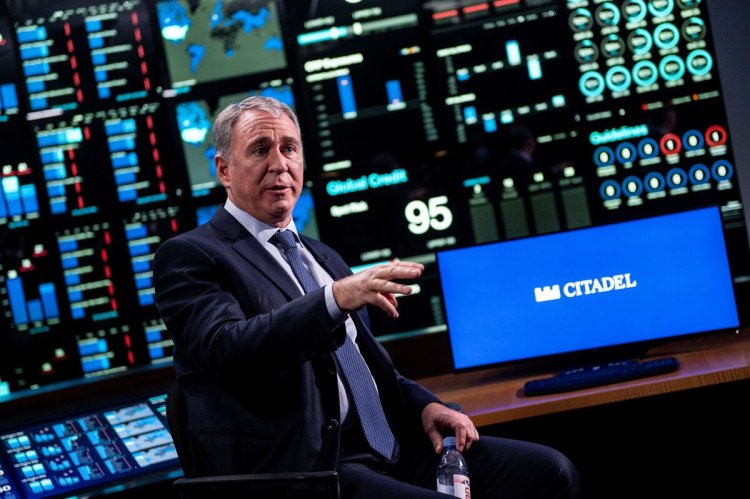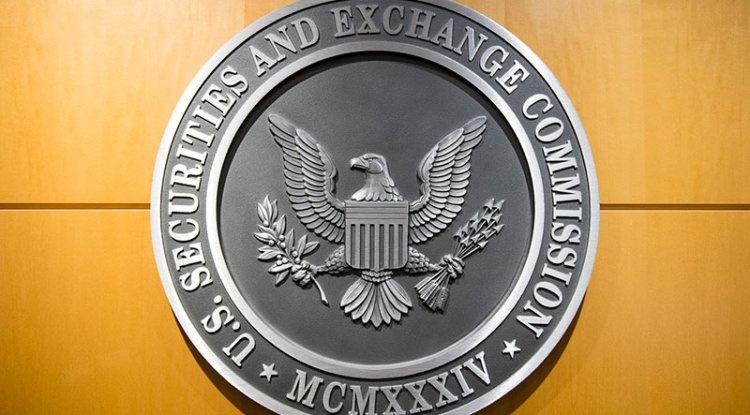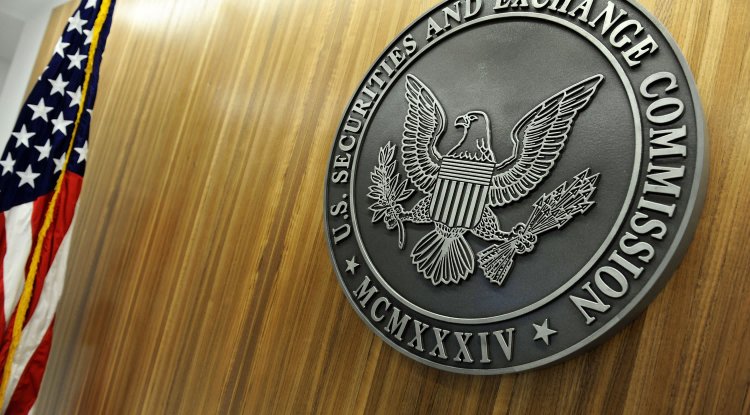10,000 Investors Demand Citadel Securities' Ban from Stock Market and Ken Griffin's Fraud Investigation
Find out why 10,000 investors are calling for Citadel Securities to be banned from the stock market and Ken Griffin to be investigated for fraud. Our comprehensive coverage provides insights and analysis on the latest developments in the finance industry

InvestorTurf conducted a poll among 10,000 investors, which revealed that many are calling for Citadel Securities to be banned and for an investigation into its founder, Ken Griffin. The reasons behind this call for action include concerns over market manipulation, conflicts of interest, lack of transparency, and potential insider trading. In this article, we will discuss these reasons in more detail.
Do you think @Citadel & @citsecurities should be banned from the stock market and Kenneth C. Griffin investigated for fraud ? — InvestorTurf (@InvestorTurf) April 8, 2023
Investors are calling for a ban on Citadel Securities, accusing the company of rigging the markets to their advantage. According to an insider, the high-frequency trading game is being manipulated by insiders who wield their influence to sway the markets in their favor. Citadel Securities is a major player in high-frequency trading, which relies on complex algorithms and supercomputers to execute trades at lightning-fast speeds, giving them an advantage that retail investors cannot match.
These allegations have caused a significant stir in financial circles, as retail investors question the fairness and transparency of the markets. The insider, has shed light on the dark corners of high-frequency trading by exposing malpractices carried out by Citadel Securities and other high-frequency trading firms. One such practice is the use of order types that are not available to ordinary investors, which enables them to execute trades at speeds that regular investors cannot match.
The insider alleges that these high-frequency trading firms, including Citadel Securities, exploit disparities in the time it takes for market data to travel across various exchanges, a practice known as "latency arbitrage". This gives them an advantage over other market participants who do not have access to such sophisticated technology.
In addition, the insider has revealed how Citadel Securities uses its market power to manipulate the market to their favor, by creating artificial liquidity in a particular security, making it easier for them to execute trades at their desired price. This strategy gives them an unfair advantage over other market participants who cannot conduct market manipulation in the same way.
The revelations by the insider have exposed the opaque and complex world of high-frequency trading and how companies like Citadel Securities employ their technological prowess to game the system in their favor. This puts retail investors at a significant disadvantage, as they cannot compete on the same level as high-frequency traders who have access to advanced technology and vast resources.
One of the main issues highlighted by the insider is the use of order types that allow high-frequency traders to execute trades at speeds that regular investors cannot match, putting retail investors at a disadvantage in the fast-paced world of high-frequency trading. Another issue is the use of latency arbitrage, which gives high-frequency traders an edge over other market participants who do not have access to the same technology, raising questions about the fairness of the market.
Accounting fraud
Citadel, the parent entity, holds a plethora of subsidiary companies that participate in the buying and selling of US treasuries among themselves. The company is essentially trading with itself, resulting in a suspiciously closed transaction loop. When the accounting of each subsidiary company takes place, there is a significant lack of transparency in disclosing all the pertinent information. To maintain the facade of book coverage, neither the parent nor affiliate company is accounting for losses. This fraudulent practice has been in operation for several years.
The regulatory body, FINRA, has issued negligible fines to Citadel, yet it has not deterred them from continuing their malpractice. The company is willing to pay millions in settlement fees while making billions in profits on the back end. Over the years, Citadel has emerged as one of the most prominent market makers on Wall Street. Confidential sources reveal that Goldman executives consider Citadel the most significant threat to their trading business. Moreover, nine brokers in the industry use Citadel as their order flow source.
These brokers include Robinhood, E-Trade, TD Ameritrade, Charles Schwab, WeBull, Ally Invest Securities, First Trade, and TradeStation. It is noteworthy that these brokers do not rely exclusively on Citadel, but the fact remains that Citadel is responsible for a substantial portion of the market's activity.
Ken Griffin
In 2021, Ken Griffin, the head of Citadel, managed to escape the wrath of the "meme stock" scandal through shrewd lobbying tactics. A day before the trading halts, Citadel and Robinhood were accused of colluding to manipulate the market.
Despite the controversy, Griffin appeared before the House Financial Services Committee on February 18 to defend his actions. Interestingly, it was later revealed that he had directly donated funds to four of the committee members: French Hill, Andy Barr, Ann Wagner, and Bill Huizenga, all Republicans. Such actions raise questions about the integrity of the political process and the influence of wealthy individuals on it.
The Ken Griffin Perjury Allegation
Allegations of Ken Griffin lying have caused a stir among retail investors on social media, with many claiming he told a significant untruth. The scale of this purported deception has provoked the attention of thousands, yet the question remains whether those in government will act upon these allegations.
Unfortunately, history suggests that such action is unlikely, as those in power typically respond only when faced with an insurmountable public outcry or when they can deflect blame onto others. Despite the gravity of the accusations against Griffin, he has yet to face any charges, a fact that many attribute to his alleged practice of donating to politicians in exchange for their silence.
A cursory glance at his political contributions supports this theory:
- GRIFFIN, KENNETH C ,CHICAGO, IL, $2,000,000, October 28, 2020, Senate Leadership Fund
- GRIFFIN, KENNETH C, CHICAGO, IL ,$5,000,000, October 14, 2020,Senate Leadership Fund
- GRIFFIN, KENNETH C,CHICAGO, IL,$5,000,000,September 3, 2020,Senate Leadership Fund
- GRIFFIN, KENNETH C, CHICAGO, IL, $10,000,000, November 12, 2020, Senate Leadership Fund
- GRIFFIN, KENNETH C, CHICAGO, IL, $15,000,000, September 23, 2020, Senate Leadership Fund
The traditional media and the government appear to be engaged in their customary stratagem of "let's not say anything, the news cycle will change in a few days and the general public have short memories, it will shortly dissipate." However, numerous people are already contacting and writing to their elected officials to inform them that they are aware and that they will not forget, since this may be one of the most significant stories in the entire memestock saga so far, as the evidence indicates that Ken Griffin committed perjury.
On January 28, 2021, multiple brokers, including Robinhood, prohibited retail investors from purchasing stocks by deactivating the "buy" button. Essentially, traders could close their positions but could not open new long positions. All of this took place while hedge funds were increasing their shorts in order to attack the price.
Conversations were taking place behind closed doors between Citadel and Robinhood, and the accusation is that they lied about it, not only to retail investors but also to the Government House Committee on Financial Services while under oath. These documents are attempting to demonstrate the collusion that they claim never occurred, in reality, did take place.
During the now-famous 'GameStop' hearing by the US House Financial Committee in February 2021, Rep Juan Vargus (California) asked Griffin if he or anyone from his company (Citadel) had conspired or done anything to promote the restriction of buying shares in GameStop. Griffin responded with an unequivocal no.
However, documents leaked by Robinhood insiders appear to contradict that statement. And if these are validated, it is evident..Ken Griffin lied under oath, which is a federal crime carrying a maximum sentence of 5 years in prison and huge fines.
Citadel and Robinhood Collusion
A legal document was filed as part of a class action lawsuit against several brokerages, including Robinhood, and market makers, including Citadel Securities. This was filed in the United States District Court of the Southern District of Florida. The complaint highlights conversations that took place within Robinhood on January 27th, which was one of the days trading of GameStop was halted by various brokerages. It also mentions the conversations between Robinhood and Citadel Securities.
The lawsuit claims that on January 27, "high-level employees of Citadel Securities and Robinhood had numerous communications with each other that indicate that Citadel applied pressure on Robinhood." Robinhood COO Gretchen Howard allegedly informed CEO Vlad Tenev in Slack that she and other Robinhood executives, including Jim Swartwout, would be on a call with Citadel Securities at 5 PM.
Later that same day, Robinhood Securities President and Chief Operating Officer Jim Swartwoth said in an internal chat that "you wouldn't believe the convo we had with Citadel, total mess."
Later that night, the lawsuit alleges that a call was set up between Tenev and a redacted person at Citadel Securities. The lawsuit notes that Swartwout later stated, "I have to say I am beyond disappointed in how this went down. It’s difficult to have a partnership when these kinds of things go down this way."
The allegations coalesced in a hashtag aimed at Citadel CEO Ken Griffin: #KenGriffinLied, which gained steam Monday afternoon when Citadel Securities insisted it "did not ask" Robinhood or any firm to restrict or limit trading activity on January 27th.
Citadel Securities went on to claim it was "the only major market maker during this time that provided continuous liquidity every minute of every trading day." Another tweet adds that Ken Griffin and Vlad Tenev "have NEVER met or spoken." The firm also tweeted a video clip of Griffin telling Congress that he did not instruct Robinhood to restrict trading, adding that he said so "truthfully."
At two points in the lawsuit, it mentions that Tenev allegedly requested to speak with Griffin, precisely because the two had never met, "not specific to this crazy issue." The lawsuit does not say that this meeting materialized. In any case, Citadel Securities's tweets and this lawsuit document have given new life to a round of conspiracy theories that have popped up here and there over the last few months. It's worth noting that Robinhood disclosed in its S-1 filing for an Initial Public Offering that it is currently being investigated by state, local, and federal regulators for its role in the GameStop mess and for halting trading.
US House Committee Financial Services Report on Robinhood and Citadel
![]() Key Finding #1: Robinhood exhibited troubling business practices, inadequate risk management, and a culture that prioritized growth above stability during the Meme Stock Market Event
Key Finding #1: Robinhood exhibited troubling business practices, inadequate risk management, and a culture that prioritized growth above stability during the Meme Stock Market Event
Key Finding #2: Broker-dealers facing the greatest operational and liquidity concerns took the most expansive trading restrictions, although multiple broker-dealers introduced trading restrictions for a variety of risk management reasons during the Meme Stock Market Event.
Key Finding #3: Most of the firms the Committee spoke to do not have explicit plans to change their policies for how they will meet their collateral requirements during extreme market volatility or adopt trading restrictions when market volatility may warrant their introduction.
Key Finding #4: The Depository Trust & Clearing Corporation (DTCC) waived $9.7 billion of collateral deposit requirements on January 28, 2021. The DTCC lacks detailed, written policies and procedures for waiver or modification of a "disincentive” charge it calculates for brokers that are deemed to be undercapitalized and has regularly waived such charges during periods of acute volatility in the two years before the Meme Stock Market Event
“k. Robinhood and Citadel Securities engaged in “blunt” negotiations the night before the trading restrictions to lower the PFOF rates Robinhood was charging Citadel Securities”
“Like many other market makers, Citadel Securities grew increasingly concerned about the magnitude of the PFOF rebates it might be required to pay Robinhood associated with GME and AMC given Robinhood’s unique PFOF rate structure in an unprecedented trading environment.199 Neither Citadel Securities employees nor Robinhood employees who spoke with the Committee could pinpoint precisely when the two firms began negotiating PFOF rebates on January 27, 2021.200 However, it is clear that by early in the evening of January 27, 2021, Citadel Securities employees communicated their concerns regarding PFOF rebates to Robinhood, particularly regarding the skyrocketing PFOF rebates being calculated for GME and AMC.”
“Before the market opened on the morning of January 28, 2021, at approximately 5:11 a.m. EST, Robinhood Securities, Robinhood’s clearing broker, received its daily automated notice from the NSCC setting out the firm’s daily collateral deposit requirement of approximately $3.7 billion.220 Given the fact that Robinhood already had approximately $700 million on deposit with the NSCC from the day before, this automated notice outlined a requirement for Robinhood Securities to deposit an additional $3 billion in its NSCC account by 10 a.m. EST”
“As further detailed in the information that the NSCC provided to Robinhood through an automated portal, the largest components of the company’s collateral deposit requirement was a Value-at-Risk charge of approximately $1.3 billion, as well as an Excess Capital Premium charge of $2.2 billion, which Robinhood had not calculated.223 Robinhood calculated that of the $1.3 billion Value-at-Risk charge, approximately $850 million was attributable to AMC and approximately $250 million was attributable to GME.”
Citadel Ban in China
Citadel Was Banned in China for 5 Years, Fined 97 Million, For allegedly Crashing the Mainland Metal Market With Illegal Short Selling.
In 2015, Citadel Securities saw one of its accounts, managed by a Shanghai-based futures trading firm, barred from trading shares by securities regulators. Citadel Securities was the first foreign broker to be caught up in Beijing's crackdown that barred 24 other accounts from the mainland's two major stock exchanges.
The attack against the so-called “malicious” short-selling was part of a wider crackdown on automated trading of stocks and futures, which was blamed for alleged trading irregularities during the 2015 rout.
Citadel securities violations and fines
US regulatory fines:
- In 2007, Citadel Securities was fined $22,500 by FINRA for failing to properly report short interest positions.
- In 2009, Citadel Securities was fined $3 million by the SEC for allegedly engaging in improper trading practices that artificially impacted the price of securities.
- In 2014, the US Securities and Exchange Commission (SEC) fined Citadel Securities $800,000 for allegedly violating the market access rule, which requires firms to have adequate risk controls and supervisory procedures in place when providing direct market access to customers.
- In 2015, Citadel Securities was fined $800,000 by the SEC for violating the Market Access Rule.
- In 2015, Citadel Securities was fined $1.5 million by FINRA for violating various rules related to trading activities.
- In 2016, Citadel Securities was fined $3.5 million by the SEC for violating the National Market System Plan governing the consolidated data feeds that disseminate stock prices and trades to the public.
- In 2017, Citadel Securities was fined $22.6 million by the SEC for misleading customers about the quality of its pricing and execution.
- In 2017, the US Financial Industry Regulatory Authority (FINRA) fined Citadel Securities $1.5 million for allegedly providing inaccurate information to customers and for failing to report trades to the appropriate regulatory entities.
- In 2018, Citadel Securities was fined $3.5 million by the SEC for failing to provide customers with accurate trade data.
- In 2019, Citadel Securities was fined $100,000 by the Commodities Futures Trading Commission (CFTC) for exceeding speculative position limits in wheat futures.
- In 2020, Citadel Securities was fined $97,000 by FINRA for failing to properly report certain equity trades.
- In 2020, the US Commodities Futures Trading Commission (CFTC) fined Citadel Securities $700,000 for allegedly violating swap data reporting requirements.
- In 2021, Citadel Securities was fined $700,000 by FINRA for failing to report a significant number of trades to FINRA's Trade Reporting and Compliance Engine (TRACE).
International regulatory fines:
14. In 2017, the European Securities and Markets Authority (ESMA) fined Citadel Securities €1.1 million for breaching market-making obligations and engaging in algo-trading activity that may have contributed to market disorder.
15. In 2017, the Autorité des marchés financiers (AMF) in France fined Citadel Securities €5 million for allegedly manipulating French government bond futures.
16. In 2018, Citadel Securities was fined €1.6 million by the Italian securities regulator (CONSOB) for market manipulation and insider trading in the Italian government bond market.
18. In 2018, the Australian Securities and Investments Commission (ASIC) fined Citadel Securities AUD 360,000 for alleged trading violations related to market integrity.
19. In 2018, the Monetary Authority of Singapore (MAS) fined Citadel Securities $230,000 for market manipulation related to its trading activities on the Singapore Exchange (SGX).
20. In 2020, the French financial regulator, Autorité des marchés financiers (AMF), fined Citadel Securities €2 million for allegedly manipulating the bond market and breaching its best execution obligations.
21. In 2020, the UK's Prudential Regulation Authority (PRA) fined Citadel Securities £1.2 million for failing to provide accurate and timely transaction reports to the regulator.
22. In 2020, the Swiss financial regulator, Swiss Financial Market Supervisory Authority (FINMA), fined Citadel Securities CHF 1.12 million for violating trading rules and engaging in market manipulation on the SIX Swiss Exchange.
23. In 2020, Citadel Securities was fined £1,445,000 by the UK Financial Conduct Authority (FCA) for inaccurate transaction reporting and failing to take reasonable care to organize and control its affairs responsibly and effectively.
24. In 2021, the UK's Financial Conduct Authority (FCA) fined Citadel Securities £1.4 million for failing to adequately report certain trades to the regulator.
25. In 2021, Citadel Securities was fined $97,000,000 in China for alleged "malicious" short-selling practices.
26. In 2021, the Korea Financial Investment Association (KFIA) reportedly fined Citadel Securities 175 million won ($155,000) for allegedly engaging in high-frequency trading activities that violated local laws.
Citadel Advisors:
27. In 2017, the Securities and Exchange Commission (SEC) fined Citadel Advisors $22.6 million for allegedly misleading investors about the fund's market timing practices.
28. In 2014, the firm paid $800,000 to settle charges with the Financial Industry Regulatory Authority (FINRA) for violating short-selling rules.
| Sign up for a free account with Investorturf to access exclusive articles that are only available to registered users. Join now and start reading! |
What's Your Reaction?







-
 Jeff JayneWhy does anyone think this is news? Citadel is might be taking unfair advantage of the market volatility but all the big retail brokers are stealing their own customer's money.3 years ago Reply
Jeff JayneWhy does anyone think this is news? Citadel is might be taking unfair advantage of the market volatility but all the big retail brokers are stealing their own customer's money.3 years ago Reply -
 JanetCan you open the voting for this again? I am sure 10,000 will rise quickly. I did not see the first poll.3 years ago Reply
JanetCan you open the voting for this again? I am sure 10,000 will rise quickly. I did not see the first poll.3 years ago Reply-
 Investorturfhttps://www.change.org/p/ban-citadel-securities-investigate-ken-griffin-for-fraud-protect-investors-interests-032a200c-17c3-4d74-a8bb-a95d6c07a7d13 years ago
Investorturfhttps://www.change.org/p/ban-citadel-securities-investigate-ken-griffin-for-fraud-protect-investors-interests-032a200c-17c3-4d74-a8bb-a95d6c07a7d13 years ago
-
-
 DonIf you don’t have the high dollar amount of funds needed for HFT. The equipment. Software. The sheer desire to sit there and trade millions of shares. You are not missing anything by not having “special” order types. To do true hft, you need to create algorithms. Programming experience. Lots of money. Etc…. Citadel isn’t the only one that offers special order types. Every main Exchange does. NYSE. NASDAQ. etc. and guess what? All the main exchanges are associated with their own sub-dark pools and hidden orders. You’re just looking to blame Citadel because everyone jumped on the “stock meme”, bandwagon thinking “Hey. I’ll just waltz right into the stock market and make fast money”. Well, you stepped into an arena you know nothing about. Got burned. Lost money. And now looking to blame Citadel. Some of the message boards are filled with ignorance on how they think the market works. “Citadel doesn’t report their trades”. Actually they do. Like everyone else. Look up TRF reporting. Anyway, mini rant over. Btw, I don’t work for Citadel or own any part of them.3 years ago Reply
DonIf you don’t have the high dollar amount of funds needed for HFT. The equipment. Software. The sheer desire to sit there and trade millions of shares. You are not missing anything by not having “special” order types. To do true hft, you need to create algorithms. Programming experience. Lots of money. Etc…. Citadel isn’t the only one that offers special order types. Every main Exchange does. NYSE. NASDAQ. etc. and guess what? All the main exchanges are associated with their own sub-dark pools and hidden orders. You’re just looking to blame Citadel because everyone jumped on the “stock meme”, bandwagon thinking “Hey. I’ll just waltz right into the stock market and make fast money”. Well, you stepped into an arena you know nothing about. Got burned. Lost money. And now looking to blame Citadel. Some of the message boards are filled with ignorance on how they think the market works. “Citadel doesn’t report their trades”. Actually they do. Like everyone else. Look up TRF reporting. Anyway, mini rant over. Btw, I don’t work for Citadel or own any part of them.3 years ago Reply -
 hyperbluIt's not that retail doesn't have the same sophisticated trading equipment, but we don't have the proximity to execute nearly as fast. Citadel uses HFT and pays brokers (PFOF) for your order flow so they can trade directly against you by giving institutional investors first dibs on a better price before they send the scraps to the lit exchange. Then they abuse minimum tick size so they can conduct trades sub-second (between seconds) to create an invalid unix timestamp and make it undetectable - because their computers are directly attached to the exchange with instantaneous white rabbit switching technology. They also interfere with other exchanges by intercepting someone else's order. That's why IEX has to intentiony delay their order by 350ms.3 years ago Reply
hyperbluIt's not that retail doesn't have the same sophisticated trading equipment, but we don't have the proximity to execute nearly as fast. Citadel uses HFT and pays brokers (PFOF) for your order flow so they can trade directly against you by giving institutional investors first dibs on a better price before they send the scraps to the lit exchange. Then they abuse minimum tick size so they can conduct trades sub-second (between seconds) to create an invalid unix timestamp and make it undetectable - because their computers are directly attached to the exchange with instantaneous white rabbit switching technology. They also interfere with other exchanges by intercepting someone else's order. That's why IEX has to intentiony delay their order by 350ms.3 years ago Reply -
 KenCitadel has $65 billion of securities sold but not bought back.3 years ago Reply
KenCitadel has $65 billion of securities sold but not bought back.3 years ago Reply














